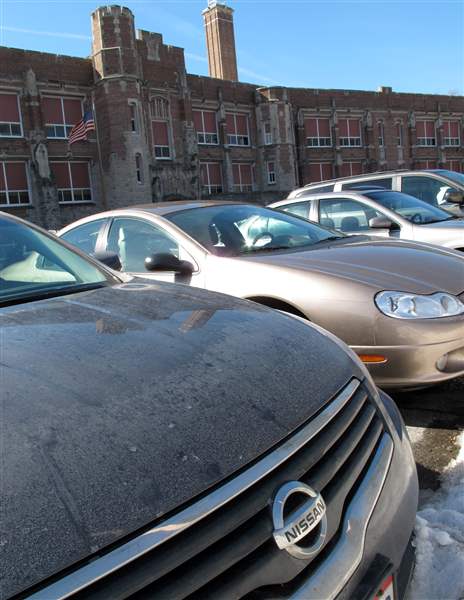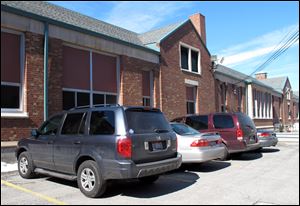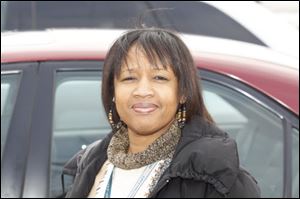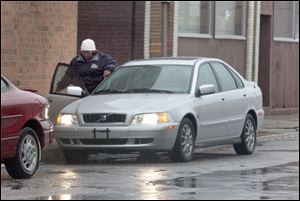
Public and Private-Sector Labor
When it comes to cars, solidarity can prove elusive
City school, police parking lots speckled with nonunion autos
3/6/2011
A Nissan is just one of the autos parked at Harvard Elementary.
THE BLADE
Buy This Image

A mix of U.S. and Japanese-brand cars are parked at Old Orchard Elementary.
"I've witnessed in the last few weeks an expression of solidarity and common cause with each other," said Francine Lawrence, president of the Toledo Federation of Teachers.
Now the question is whether this newfound fellowship will carry over to buying habits. Past experience suggests that some public union members are fine with reaping workplace benefits achieved through the historic victories of their private-sector counterparts but are indifferent about supporting these labor allies with their checkbooks.
For a number of Toledo-area teachers, police officers, firefighters, office workers, and skilled tradesmen, the union card seems to slip from the wallet or at least the mind each time they bypass a Jeep lot for a Honda dealership.
"You go in a school parking lot, you see a lot of foreign-made vehicles," said Ken Lortz, regional director for the United Auto Workers in Ohio. "Hopefully that's something we can get turned around."
The Blade recently toured the employee parking lots of numerous area schools and some unionized city of Toledo employees, noting which vehicles were assembled by union labor and which were not.
PHOTO GALLERY
These spot checks should not be considered definitive surveys of car ownership. Still, they do give a general indication of the types of cars public union employees are driving.

Denise Chandler, a Toledo Public School teacher said she would consider buying a union-made car, but it would depend on how convenient and affordable it is.
In the other two parking sites — Harvard Elementary School and McCord Junior High School — union autos were outnumbered. A full 60 percent of the cars in the elementary school's lot were nonunion.
Confronted about their nonunion vehicles, some teachers were apologetic and others were unashamed.
"I'll consider it, but it just depends on how convenient it is," said Toyota Camry driver Denise Chandler, a Toledo Public Schools special education teacher at Samuel M. Jones at Gunckel Park Middle School. "If it's affordable, I will consider union."
Marjorie Harris, a TPS substitute teacher and a member of the teachers' union, drives a nonunion-made Nissan Altima that she said she received as a gift.
"I just shop what I like," she said. "I don't really go union or nonunion, but I know that I should."
One Lucas County sheriff's employee refused to talk about her car ownership Saturday afternoon as she exited work and climbed into a Volvo.
Higher-wage union labor and retiree costs have made it challenging for American car companies to compete with lower-paying and more nimble foreign competitors. Industry analysis for the middle of the last decade shows the Detroit Three automakers losing more than $1,000 on every vehicle they sold.

A Nissan is just one of the autos parked at Harvard Elementary.
That revenue gap has significantly narrowed since American automakers' 2007 contract with the UAW and the 2009 bankruptcy reorganizations of General Motors and Chrysler. A survey of price-comparison guides shows general parity between 2011-model vehicles assembled with union labor versus nonunion labor.
Driving American, union-made vehicles is all but a lifetime oath among UAW members. Heaven help the owner of a Honda Civic, a South Korean-built Chevrolet Aveo, or even a Mexico-made Ford Fusion who tries parking at the UAW Local 12 hall on Ashland Avenue in Toledo. A sign announces in red capital letters: "Autos not built by the UAW are not welcome in this lot."
It's also taboo for a UAW worker to buy a spouse or child a vehicle assembled without union labor.
Lucas County Commissioner Pete Gerken irked his union pals during the 2009 Christmas season when he leased for his wife, Polly Taylor-Gerken, an Acura TL manufactured in Marysville, Ohio, by nonunion Honda employees. A Democrat and retired UAW official, Mr. Gerken drove the car back to its dealership once the word got out.
Sen. John McCain (R., Ariz.) came under fire from the UAW during his 2008 presidential campaign when he flip-flopped on the subject of his daughter's Toyota Prius. He initially told a New York newspaper that he bought his daughter the foreign-made car but slammed into reverse when asked about the Prius by a Michigan newscaster, insisting that she bought it herself.
Toledo teachers union members aren't required to buy union-made vehicles, but they are encouraged to. By law in Ohio, all employees in a union shop must pay dues or similar agency fees.
"There is no formal directive but that's something that I've always promoted to our members, that they drive union-made products," said Mrs. Lawrence, who owns a union-made Lincoln and whose husband drives a Jeep. "We promote ‘buy union-made products,' and just like any organization or union, some follow it more than others."
Dan Greenberg, vice president of the Sylvania Education Association union, said that buying union-made cars is encouraged among his members. Mr. Greenberg, who has two union-made cars, said he is even more "vigilant" about buying union products after attending a local rally against Senate Bill 5 with a large turnout from private-sector union members.

A Lucas County sheriff's employee leaving work enters the passenger door of a Volvo parked on Canton Street in downtown Toledo. She refused to talk about her car ownership.
Chrysler employee Royal Barber III of Sylvania Township was glad to hear of public union members committed to buying UAW products. Even when workers are in different unions, it's important that they support the overall movement, he said.
"If you want me to support you, then you support me, and everyone is stronger through solidarity," said Mr. Barber, a UAW member. "That's the way it should be."
The Senate bill, which narrowly gained approval last week, curtails collective-bargaining rights for public employees and is viewed by many labor supporters as an attack on all unions. Gov. John Kasich, a Republican, says the bill is necessary to address the state's yawning budget deficit.
Dan Wagner, president of the Toledo Police Patrolman's Association, said he hopes his colleagues will buy union-made vehicles out of loyalty, although many of them already prefer such autos based on positive experiences with the department's fleet of Dodge Chargers and Ford Crown Victorias.
Contact JC Reindl at: jcreindl@theblade.com or 419-724-6065.